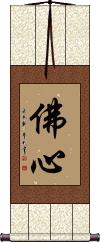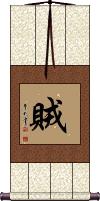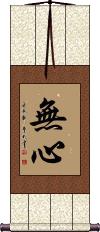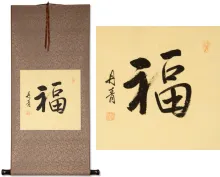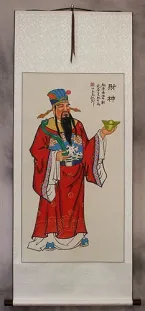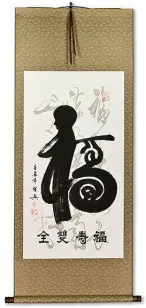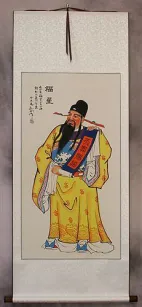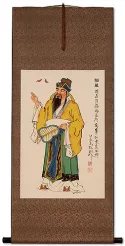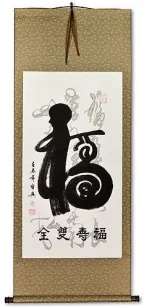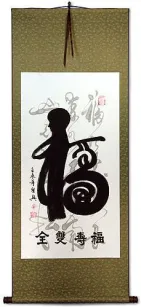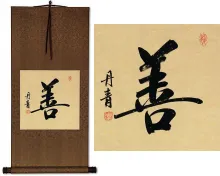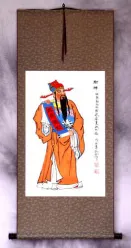Many custom options...
And formats...

Good and Evil in Chinese / Japanese...
Buy a Good and Evil calligraphy wall scroll here!
Personalize your custom “Good and Evil” project by clicking the button next to your favorite “Good and Evil” title below...
Good and Evil
Distinguish Good and Evil
Buddha Heart / Mind of Buddha
佛心 means the Buddha's mind, Buddha-heart, or the spiritually enlightened heart/mind.
The Buddha Heart is detached from good and evil and other such constructs. The Buddha Heart has mercy, compassion, and loving-kindness for all sentient life, the good, the wicked, and all in between.
The heart and mind (心) are the same concepts in the ancient Orient, so you can use heart and mind interchangeably in this context.
Rebel / Insurgent
People keep asking me for rebel as a single Chinese character, Korean Hanja, or Japanese Kanji.
The problem is, rebel is not really a good word in Asian culture (depending on the context in which it is used). 賊 is a rebel symbol that can also mean thief; traitor; evil; robber; burglar; insurgent; or a spoiler. Used as an adjective, it can mean wily or deceitful.
No Mind / Mushin
In Japanese, 無心 means innocent or without knowledge of good and evil. It literally means “without mind.”
無心 is one of the five spirits of the warrior (budo) and is often used as a Japanese martial arts tenet. Under that context, places such as the Budo Dojo define it this way: “No mind, a mind without ego. A mind like a mirror which reflects and dos not judge.” The original term was “mushin no shin,” meaning “mind of no mind.” It is a state of mind without fear, anger, or anxiety. Mushin is often described by the phrase “Mizu no Kokoro,” which means “mind like water.” The phrase is a metaphor describing the pond that clearly reflects its surroundings when calm but whose images are obscured once a pebble is dropped into its waters.
This has a good meaning in conjunction with Chan / Zen Buddhism in Japan. However, out of that context, it means mindlessness or absent-mindedness. To non-Buddhists in China, this is associated with doing something without thinking.
In Korean, this usually means indifference.
Use caution and know your audience before ordering this selection.
More info: Wikipedia: Mushin
This in-stock artwork might be what you are looking for, and ships right away...
Gallery Price: $31.00
Your Price: $16.88
Gallery Price: $65.00
Your Price: $39.88
Gallery Price: $90.00
Your Price: $49.88
Good Fortune / Prosperity Saint Wall Scroll
Discounted Blemished
Gallery Price: $71.00
Your Price: $39.00
Good Luck Special Calligraphy Wall Scroll
Discounted Blemished
Gallery Price: $53.00
Your Price: $29.00
Handmade Good Luck Special Calligraphy Wall Scroll
Discounted Blemished
Gallery Price: $35.00
Your Price: $19.00
Unique Good Luck Special Calligraphy Wall Scroll
Discounted Blemished
Gallery Price: $31.00
Your Price: $17.00
Decorative Good Luck Special Calligraphy Wall Scroll
Discounted Blemished
Gallery Price: $31.00
Your Price: $17.00
Gallery Price: $65.00
Your Price: $39.88
Not the results for Good and Evil that you were looking for?
Below are some entries from our dictionary that may match your Good and Evil search...
| Characters If shown, 2nd row is Simp. Chinese |
Pronunciation Romanization |
Simple Dictionary Definition |
業 业 see styles |
yè ye4 yeh waza わざ |
More info & calligraphy: Karmadeed; act; work; performance; (personal name) Hajime karman, karma, "action, work, deed"; "moral duty"; "product, result, effect." M.W. The doctrine of the act; deeds and their effects on the character, especially in their relation to succeeding forms of transmigration. The 三業 are thought, word, and deed, each as good, bad, or indifferent. Karma from former lives is 宿業, from present conduct 現業. Karma is moral action that causes future retribution, and either good or evil transmigration. It is also that moral kernel in which each being survives death for further rebirth or metempsychosis. There are categories of 2, 3, 4, 6, and 10; the 六業 are rebirth in the hells, or as animals, hungry ghosts, men, devas, or asuras: v. 六趣. |
索 see styles |
suǒ suo3 so saku さく |
More info & calligraphy: Soe(counter) {mahj} counter for bamboo tiles; (given name) Saku Cord; to extort, express; the cord or noose of Guanyin by which she binds the good; the cord of the vajra-king by which he binds the evil; translit. sa. |
佛心 see styles |
fó xīn fo2 xin1 fo hsin busshin |
More info & calligraphy: Buddha Heart / Mind of BuddhaThe mind of Buddha, the spiritually enlightened heart. A heart of mercy; a heart abiding in the real, not the seeming; detached from good and evil and other such contrasts. |
精進 精进 see styles |
jīng jìn jing1 jin4 ching chin shoujin / shojin しょうじん |
More info & calligraphy: Devotion / Diligence / Vigorous / Energetic(n,vs,vi) (1) concentration; diligence; devotion; (n,vs,vi) (2) {Buddh} (See 六波羅蜜) asceticism; zeal in one's quest for enlightenment; (n,vs,vi) (3) adherence to a vegetarian diet; (surname) Shoujin vīrya, one of the seven bodhyaṅga; 'vigour,' 'valour, fortitude,' 'virility' (M.W.); 'welldoing' (Keith). The Chinese interpretation may be defined, as pure or unadulterated progress, i.e. 勤 zeal, zealous, courageously progressing in the good and eliminating the evil.; vīrya, zeal, unchecked progress. |
正精進 正精进 see styles |
zhèng jīng jìn zheng4 jing1 jin4 cheng ching chin shoushoujin / shoshojin しょうしょうじん |
More info & calligraphy: 6. Right Effort / Right Endeavor / Perfect Effortsamyagvyāyāma, right effort, zeal, or progress, unintermitting perseverance, the sixth of the 八正道; 'right effort, to suppress the rising of evil states, to eradicate those which have arisen, to stimulate good states, and to perfect those which have come into being. ' Keith. |
善悪不二 see styles |
zenakufuni ぜんあくふに |
More info & calligraphy: Good and Evil |
彰善癉惡 彰善瘅恶 see styles |
zhāng shàn dàn è zhang1 shan4 dan4 e4 chang shan tan o |
More info & calligraphy: Distinguish Good and Evil |
根 see styles |
gēn gen1 ken ne ね |
root; basis; classifier for long slender objects, e.g. cigarettes, guitar strings; CL:條|条[tiao2]; radical (chemistry) (1) root (of a plant); (2) root (of a tooth, hair, etc.); center (of a pimple, etc.); (3) root (of all evil, etc.); source; origin; cause; basis; (4) one's true nature; (5) (fishing) reef; (personal name) Nemawari mūla, a root, basis, origin; but when meaning an organ of sense, indriyam, a 'power', 'faculty of sense, sense, organ of sense'. M.W. A root, or source; that which is capable of producing or growing, as the eye is able to produce knowledge, as faith is able to bring forth good works, as human nature is able to produce good or evil karma. v. 五根 and 二十二根. |
祓 see styles |
fú fu2 fu harae はらえ harai はらい |
to cleanse; to remove evil; ritual for seeking good fortune and avoiding disaster purification; exorcism |
七曜 see styles |
qī yào qi1 yao4 ch`i yao chi yao shichiyou / shichiyo しちよう |
the seven planets of premodern astronomy (the Sun, the Moon, Mercury, Venus, Mars, Jupiter, and Saturn) (1) {astron} the seven luminaries (sun, moon, Mercury, Venus, Mars, Jupiter and Saturn); (2) the seven days of the week The seven brilliant ones — the sun and moon, together with the five planets which are connected with fire, water, wood, metal, and earth. Their essence shines in the sky, but their spirits are over men as judges of their good and evil, and as rulers over good and evil fortune. The following list shows their names in Chinese and Sanskrit: Sun 日, 太陽; aditya 阿彌底耶 Moon月, 太陰; soma 蘇摩 Mars火星, 勢惑勞; aṅgāraka 盎哦囉迦 Mercury水星, 辰星; budha 部陀 Jupiter木星, 歳星; bṛhaspati 勿哩訶娑跛底 Venus金星, 太白; śukra 戌羯羅 Saturn土星, 鎭星; śanaiścara 賖乃以室折羅. |
三因 see styles |
sān yīn san1 yin1 san yin miyori みより |
{Buddh} (See 三因仏性) three causes of Buddha nature; (place-name) Miyori The six "causes" of the Abhidharma Kośa 倶舍論 as reduced to three in the Satyasiddhi śāstra 成實論, i.e. 生因 producing cause, as good or evil deeds cause good or evil karma; 習因 habit cause, e.g. lust breeding lust; 依因 dependent or hypostatic cause, e.g. the six organs 六根 and their objects 六境 causing the cognitions 六識. |
三心 see styles |
sān xīn san1 xin1 san hsin sanshin さんしん |
(given name) Sanshin The three minds, or hearts; various groups are given: (1) Three assured ways of reaching the Pure Land, by (a) 至誠心 perfect sincerity; (b) 深 profound resolve for it; (c) 廻向接發願心 resolve on demitting one's merits to others. (2) (a) 根本心 The 8th or ālaya-vijñāna mind, the storehouse, or source of all seeds of good or evil; (b) 依本 the 7th or mano-vijñāna mind, the mediating cause of all taint; (c) 起事心 the ṣaḍāyatana-vijñāna mind, the immediate influence of the six senses. (3) (a) 入心 (b) 住心 (c) 出心 The mind entering into a condition, staying there, departing. (4) A pure, a single, and an undistracted mind. There are other groups. |
三想 see styles |
sān xiǎng san1 xiang3 san hsiang sansō |
The three evil thoughts are the last, desire, hate, malevolence; the three good thoughts are 怨想 thoughts of (love to) enemies, 親想 the same to family and friends, 中人想 the same to those who are neither enemies nor friends, i.e. to all; v. 智度論 72. |
三根 see styles |
sān gēn san1 gen1 san ken mine みね |
(place-name, surname) Mine The three (evil) 'roots'— desire, hate, stupidity, idem 三毒. Another group is the three grades of good roots, or abilities 上, 中, 下 superior, medium, and inferior. Another is the three grades of faultlessness 三無漏根. |
三業 三业 see styles |
sān yè san1 ye4 san yeh sangou / sango さんごう |
{Buddh} (See 身口意) three activities (action, speech and thought) trividha-dvāra. The three conditions, inheritances, or karma, of which there are several groups. (1) Deed, word, thought, 身, 口, 意. (2) (a) Present-1ife happy karma; (6) present-life unhappy karma; (c) 不動 karma of an imperturbable nature. (3) (a) Good; (b) evil; (c) neutral karma. (4) (a) 漏業 Karma of ordinary rebirth; (6) 無漏業 karma of Hīnayāna nirvana; (c) 非漏非無漏 karma of neither, independent of both, Mahāyāna nirvana. (5) (a) Present deeds and their consequences in this life; (b) present deeds and their next life consequences; (c) present deeds and consequences after the next life, There are other groups of three. |
三行 see styles |
sān xíng san1 xing2 san hsing miyuki みゆき |
(g,p) Miyuki Three lines of action that affect karma, i.e. the ten good deeds that cause happy karma; the ten evil deeds that cause unhappy karma; 不動業 or 無動行 karma arising without activity, e.g. meditation on error and its remedy. |
三識 三识 see styles |
sān shì san1 shi4 san shih sanshiki |
The three states of mind or consciousness: 眞識 the original unsullied consciousness or Mind, the tathāgatagarbha, the eighth or ālaya 阿賴耶識 ; 現識 mind or consciousness diversified in contact with or producing phenomena, good and evil; 分別識 consciousness discriminating and evolving the objects of the five senses. Also 意識 manas, 心識 ālaya, and 無垢識 amala, v. 識. |
下轉 下转 see styles |
xià zhuǎn xia4 zhuan3 hsia chuan geten |
The downward turn, in transmigration. Primal ignorance or unenlightenment 無明acting against the primal, true, or Buddha-nature causes transmigration. The opposite is上轉 when the good prevails over the evil. 下轉is sometimes used for 下化 to save those below. |
不二 see styles |
bù èr bu4 er4 pu erh fuji ふじ |
the only (choice, way etc); undivided (loyalty) {Buddh} advaitam (non-duality); (surname, female given name) Fuji advaya. No second, non-duality, the one and undivided, the unity of all things, the one reality、 the universal Buddha-nature. There are numerous combinations, e. g. 善惡不二 good and evil are not a dualism: nor are 有 and 空 the material and immaterial, nor are 迷 and 悟 delusion and awareness— all these are of the one Buddha-nature. |
不善 see styles |
bù shàn bu4 shan4 pu shan fuzen ふぜん |
bad; ill; not good at; not to be pooh-poohed; quite impressive evil; sin; vice; mischief Not good; contrary to the right and harmful to present and future life, e. g. 五逆十惡. |
二因 see styles |
èr yīn er4 yin1 erh yin niin / nin にいん |
{Buddh} two causes Two causes, of which there are various definitions: (1) 生因 The producing cause (of all good things); and 了因 the revealing or illuminating cause i.e. knowledge, or wisdom. (2) 能生因 The 8th 識 q. v.: the cause that is able to produce all sense and perceptions, also all good and evil; and 方便因 the environmental or adaptive cause, which aids the 8th 識, as water or earth does the seed, etc. (3) 習因 or 同類因 Practice or habit as cause e. g. desire causing desire; and 報因 or 果熟因 the rewarding cause, or fruit-ripening cause, e. g. pleasure or pain caused by good or evil deeds. (4) 正因 Correct or direct cause i.e. the Buddha-nature of all beings; and 緣因 the contributory cause, or enlightenment (see 了因 above) which evolves the 正因 or Buddha-nature by good works. (5) 近因 Immediate or direct cause and 遠因 distant or indirect cause or causes. |
二果 see styles |
èr guǒ er4 guo3 erh kuo nika |
Sakṛdāgāmin; v. 裟 and 斯. The second "fruit" of the four kinds of Hīnayāna arhats, who have only once more to return to mortality. Also the two kinds of fruit or karma: (a) 習氣果 The good or evil characteristics resulting from habit or practice in a former existence; (b) 報果the pain or pleasure resulting (in this life) from the practices of a previous life. |
二業 二业 see styles |
èr yè er4 ye4 erh yeh nigyou / nigyo にぎょう |
(archaism) restaurants and geisha establishments Two classes of karma. (1) (a) 引業 leads to the 總報, i.e. the award as to the species into which one is to be born, e.g. men, gods, etc.; (6) 滿業 is the 別報 or fulfillment in detail, i.e. the kind or quality of being e.g. clever or stupid, happy or unhappy, etc. (2) (a) 善業 and (b) 惡業 Good and evil karma, resulting in happiness or misery. (3) (a) 助業 Aids to the karma of being reborn in Amitābha's Pure—land e. g. offerings, chantings, etc.; (b) 正業 thought and invocation of Amitābha with undivided mind, as the direct method. |
五心 see styles |
wǔ xīn wu3 xin1 wu hsin go shin |
The five conditions of mind produced by objective perception: 卒爾心 immediate or instantaneous, the first impression; 尋求心attention, or inquiry; 決定心conclusion, decision; 染淨心the effect, evil or good; 等流心the production therefrom of other causations. |
五果 see styles |
wǔ guǒ wu3 guo3 wu kuo goka ごか |
(1) five fruits (peach, Japanese plum, apricot, jujube, Japanese chestnut); (2) (Buddhist term) five types of effect in cause-and-effect relationships; (3) (Buddhist term) five effects of ignorance and formations on one's current life The five fruits, or effects; there are various groups, e. g. I. (1) 異熟果 fruit ripening divergently, e. g. pleasure and goodness are in different categories; present organs accord in pain or pleasure with their past good or evil deeds; (2) 等流果 fruit of the same order, e. g. goodness reborn from previous goodness; (3) 土用果 present position and function fruit, the rewards of moral merit in previous lives; (4) 增上果 superior fruit, or position arising from previous earnest endeavor and superior capacity: (5) 離繋果 fruit of freedom from all bonds, nirvana fruit. II. Fruit, or rebirth: (1) 識 conception (viewed psychologically); (2) 名色 formation mental and physical; (3) 六處 the six organs of perception complete; (4) 觸 their birth and contact with the world; (5) 受 consciousness. III. Five orders of fruit, with stones, pips, shells (as nuts), chaff-like (as pine seeds), and with pods. |
五蘊 五蕴 see styles |
wǔ yùn wu3 yun4 wu yün goun / gon ごうん |
the Five Aggregates (from Sanskrit "skandha") (Buddhism) {Buddh} the five skandhas (matter, sensation, perception, mental formations and consciousness); the five aggregates The five skandhas, pañca-skandha: also 五陰; 五衆; 五塞犍陀 The five cumulations, substances, or aggregates, i. e. the components of an intelligent being, specially a human being: (1) 色 rūpa, form, matter, the physical form related to the five organs of sense; (2) 受 vedana, reception, sensation, feeling, the functioning of the mind or senses in connection with affairs and things; (3) 想 saṃjñā, conception, or discerning; the functioning of mind in distinguishing; (4) 行 saṃskāra, the functioning of mind in its processes regarding like and dislike, good and evil, etc.; (5) 識 vijñāna, mental faculty in regard to perception and cognition, discriminative of affairs and things. The first is said to be physical, the other four mental qualities; (2), (3), and (4) are associated with mental functioning, and therefore with 心所; (5) is associated with the faculty or nature of the mind 心王 manas. Eitel gives— form, perception, consciousness, action, knowledge. See also Keith's Buddhist Philosophy, 85-91. |
六因 see styles |
liù yīn liu4 yin1 liu yin rokuin |
The six causations of the 六位 six stages of Bodhisattva development, q. v. Also, the sixfold division of causes of the Vaibhāṣikas (cf. Keith, 177-8); every phenomenon depends upon the union of 因 primary cause and 緣 conditional or environmental cause; and of the 因 there are six kinds: (1) 能作因 karaṇahetu, effective causes of two kinds: 與力因 empowering cause, as the earth empowers plant growth, and 不障因 non-resistant cause, as space does not resist, i. e. active and passive causes; (2) 倶有因 sahabhūhetu, co-operative causes, as the four elements 四大 in nature, not one of which can be omitted; (3) 同類因 sabhāgahetu, causes of the same kind as the effect, good producing good, etc.; (4) 相應因 saṃprayuktahetu, mutual responsive or associated causes, e. g. mind and mental conditions, subject with object; Keith gives 'faith and intelligence'; similar to (2); (5) 遍行因 sarvatragahetu, universal or omnipresent cause, i. e. of illusion, as of false views affecting every act; it resembles (3) but is confined to delusion; (6) 異熟因 vipākahetu, differental fruition, i. e. the effect different from the cause, as the hells are from evil deeds. |
凡習 凡习 see styles |
fán xí fan2 xi2 fan hsi bonshū |
The practices, good and evil, of commom ,or unconverted men. |
勤息 see styles |
qín xī qin2 xi1 ch`in hsi chin hsi gonsoku ごんそく |
(surname) Gonsoku A tr. of śramaṇa, one who diligently pursues the good, and ceases from evil. |
勧懲 see styles |
kanchou / kancho かんちょう |
(abbreviation) (See 勧善懲悪) rewarding good and punishing evil |
Click here for more Good and Evil results from our dictionary
The following table may be helpful for those studying Chinese or Japanese...
| Title | Characters | Romaji (Romanized Japanese) | Various forms of Romanized Chinese | |
| Good and Evil | 善悪不二 | zenakufuni | ||
| Distinguish Good and Evil | 彰善癉惡 彰善瘅恶 | zhāng shàn dàn è zhang1 shan4 dan4 e4 zhang shan dan e zhangshandane | chang shan tan o changshantano |
|
| Buddha Heart Mind of Buddha | 佛心 | busshin / bushin | fó xīn / fo2 xin1 / fo xin / foxin | fo hsin / fohsin |
| Rebel Insurgent | 賊 贼 | zoku | zéi / zei2 / zei | tsei |
| No Mind Mushin | 無心 无心 | mu shin / mushin | wú xīn / wu2 xin1 / wu xin / wuxin | wu hsin / wuhsin |
| In some entries above you will see that characters have different versions above and below a line. In these cases, the characters above the line are Traditional Chinese, while the ones below are Simplified Chinese. | ||||
Successful Chinese Character and Japanese Kanji calligraphy searches within the last few hours...


